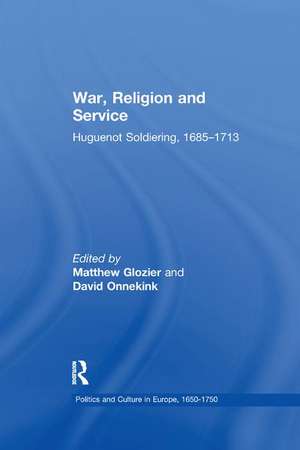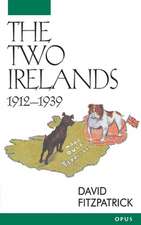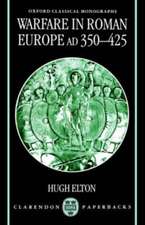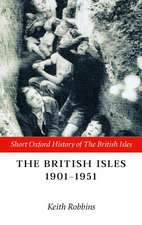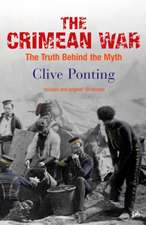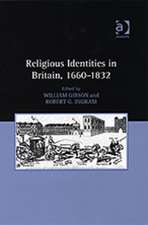War, Religion and Service: Huguenot Soldiering, 1685–1713: Politics and Culture in Europe, 1650-1750
Editat de Matthew Glozier, David Onnekinken Limba Engleză Paperback – 8 mar 2017
| Toate formatele și edițiile | Preț | Express |
|---|---|---|
| Paperback (1) | 469.34 lei 6-8 săpt. | |
| Taylor & Francis – 8 mar 2017 | 469.34 lei 6-8 săpt. | |
| Hardback (1) | 1054.71 lei 6-8 săpt. | |
| Taylor & Francis – 28 noi 2007 | 1054.71 lei 6-8 săpt. |
Preț: 469.34 lei
Nou
Puncte Express: 704
Preț estimativ în valută:
89.81€ • 94.02$ • 74.31£
89.81€ • 94.02$ • 74.31£
Carte tipărită la comandă
Livrare economică 05-19 aprilie
Preluare comenzi: 021 569.72.76
Specificații
ISBN-13: 9781138275751
ISBN-10: 1138275751
Pagini: 324
Dimensiuni: 156 x 234 x 17 mm
Greutate: 0.45 kg
Ediția:1
Editura: Taylor & Francis
Colecția Routledge
Seria Politics and Culture in Europe, 1650-1750
Locul publicării:Oxford, United Kingdom
ISBN-10: 1138275751
Pagini: 324
Dimensiuni: 156 x 234 x 17 mm
Greutate: 0.45 kg
Ediția:1
Editura: Taylor & Francis
Colecția Routledge
Seria Politics and Culture in Europe, 1650-1750
Locul publicării:Oxford, United Kingdom
Cuprins
Contents: Introduction, Matthew Glozier and David Onnekink; Huguenot soldiering c1560-1685: the origins of a tradition, D.J.B. Trim; Huguenots and Huguenot regiments in the British army, 1660-1702: 'Cometh the moment, cometh the men', John Childs; A study in misplaced loyalty: Louis de Durfort-Duras, Earl of Feversham (1640-1709), Philip Rambaut; 'The good Lord Galway': the English and Irish careers of a Huguenot leader, Randolph Vigne; 'Janisaries and spahees and pretorian band': perceptions of Huguenot soldiers in Williamite England, David Onnekink; Schomberg, Ruvigny and the Huguenots in Ireland: William III's Irish wars, 1689-91, Harman Murtagh; Huguenot soldiers in Dutch service: 'a good captain to disperse the royal troops', Matthew Glozier and David Onnekink; Au réfugié: Huguenot officers in the Hague, 1687, Dianne W. Ressinger; The refugees in the army of Brandenburg-Prussia: 'those unfortunate banished people from France', Helmut Schnitter; Integration and social ascent of Huguenot soldiers in Brandenburg-Prussia: the impact of the Edict of Potsdam, Detlef Harms; Huguenot soldiers in Brandenburg-Prussia under Friedrich Wilhelm and Friedrich III (1640-1713): the state of research in German military, migration and confessional history, Matthias Asche; 'The court at Celle...is completely French': Huguenot soldiers in the Duchy of Brunswick-Lüneburg, Andreas Flick; Huguenots in the army of Savoy-Piedmont: Protestant soldiers and civilians in the Savoyard state in the 17th and 18th century, Paola Bianchi; Huguenot soldiers in Russia: a study in military competence, Matthew Glozier; Bibliography; Index.
Notă biografică
Matthew Glozier is Honorary Associate at the Centre for Medieval Studies, The University of Sydney, Australia. David Onnekink is Lecturer at the Universiteit Utrecht and the Universiteit Leiden, The Netherlands.
Recenzii
’Glozier and Onnekink have edited a volume of stimulating essays... The book adds to our knowledge of professional soldiers of early modem Europe, specifically those motivated (like Scots Protestants and Irish Roman Catholics) to pursue military careers outside of their native lands... The volume has an array of supporting materials. In addition to an index, footnotes and a comprehensive bibliography there are a few illustrations. ... The book will hopefully serve not only to introduce readers to the impact of Huguenot soldiers (especially officers) on European armies, but will also inspire further research.’ Seventeenth-Century News
Descriere
The book addresses the role of the Huguenots as an international force both before and after the infamous Revocation of the Edict of Nantes in 1685 - an overlooked aspect of Early Modern soldiering. The Huguenots were of great importance internationally in armies and this book seeks to redress that scholarly imbalance by focusing on French Protestant soldiers individually and as a group. It also presents a number of thematic and biographical studies that offer a useful insight into the unique experience of one of Europe's best-known contemporary minorities and (later on) the people that gave the word 'refugee' to the English language.
